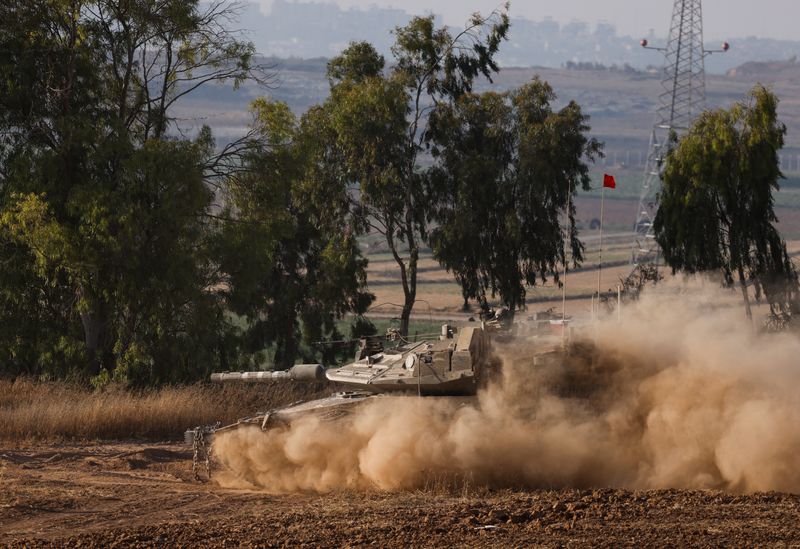Author: Nidal Mugrabi and Kamal Hamdan
CAIRO/GAZA (Reuters) – Israeli forces advanced further into the Shejaia community in northern Gaza on Sunday and further into western and central Rafah in the south, residents said, killing at least six Palestinians and Several houses were destroyed.
Residents said Israeli tanks returning to Shejaya four days ago fired shells at several houses, leaving some families trapped inside and unable to leave.
Speaking at a weekly cabinet meeting on Sunday, Israeli Prime Minister Benjamin Netanyahu reiterated his position that there is no substitute for victory in the war against Islamist militant group Hamas.
“We are committed to fighting until all of our goals are achieved: the elimination of Hamas, the return of all hostages, ensuring that Gaza no longer poses a threat to Israel, and the safe return of our residents to their homes in the south and north,” he said.
While the offensive was focused on Gaza, in the Israeli-occupied West Bank, an Israeli attack near the city of Tulkarem killed one man and wounded five others, according to the Palestinian Health Ministry. The group said the deceased was a member of the militant group Islamic Jihad. The Israeli military had no comment.
Hours after Netanyahu’s comments about Gaza, the armed wing of Hamas released a video claiming to show weapons making in a show of defiance.
The video, which was not immediately confirmed by Reuters, showed fighter jets preparing anti-tank rocket warheads. A large television screen in the background displays recent news events, indicating that the video is recent.
“Our preparations continue,” the video concludes.
The Israeli military said troops operating in Shejaya killed several Palestinian gunmen over the past day and discovered military infrastructure as well as dozens of weapons and “valuable intelligence documents” inside a United Nations school.
On Saturday, the military announced the deaths of two Israeli soldiers in northern Gaza.
The military said that in another raid in Shejaya, troops found a “terror war room” at a clinic and again accused Hamas of “embedding itself in civilian buildings for terror purposes.”
Hamas denies using civilian sites such as schools and hospitals for military purposes.
Armed factions of Hamas and Islamic Jihad reported heavy fighting in both Shejaya and Rafah, with their fighters firing anti-tank rockets and mortars at Israeli forces operating there.
More than eight months into Israel’s air and ground war in Gaza, militants continue to launch attacks against Israeli forces in areas they claimed they controlled months ago.
Ceasefire efforts stalled
Efforts by Arab mediators backed by the United States have stalled. Hamas says any deal must end the war and prompt a full Israeli withdrawal from Gaza. Israel says it will accept only a temporary cessation in fighting until Hamas, which has ruled Gaza since 2007, is eliminated.
According to Israeli statistics, the war began on October 7 when militants led by Hamas attacked southern Israel, killing about 1,200 people and taking 250 hostages.
Israel’s retaliatory offensive has so far killed nearly 38,000 people and reduced the built-up coastal enclave to rubble, according to Gaza’s health ministry.
The ministry did not distinguish between combatants and non-combatants, but officials said most of the dead were civilians. More than 300 Israeli soldiers have been killed in Gaza, and Israel says at least a third of the Palestinian dead were fighters.
Israeli tanks penetrated several areas east, west and center of Rafah on Sunday, close to the Egyptian border, and medics said six people were killed in an Israeli attack on a house in Shabra in central Rafah.
The six bodies of the Zulub family were moved to Nasser Hospital in the nearby city of Khan Younis, where dozens of relatives paid their respects.

Residents said Israeli forces burned down the Awada Mosque in central Rafah, one of the city’s most famous mosques.
Israel says its military operation in Rafah is aimed at eliminating the last remaining militant battalions of Hamas.
(Reporting and writing by Nidal al-Mughrabi in Cairo. Additional reporting by Ari Rabinovitch in Jerusalem Editing by Gareth Jones, Frances Kerry, Philippa Fletcher)

